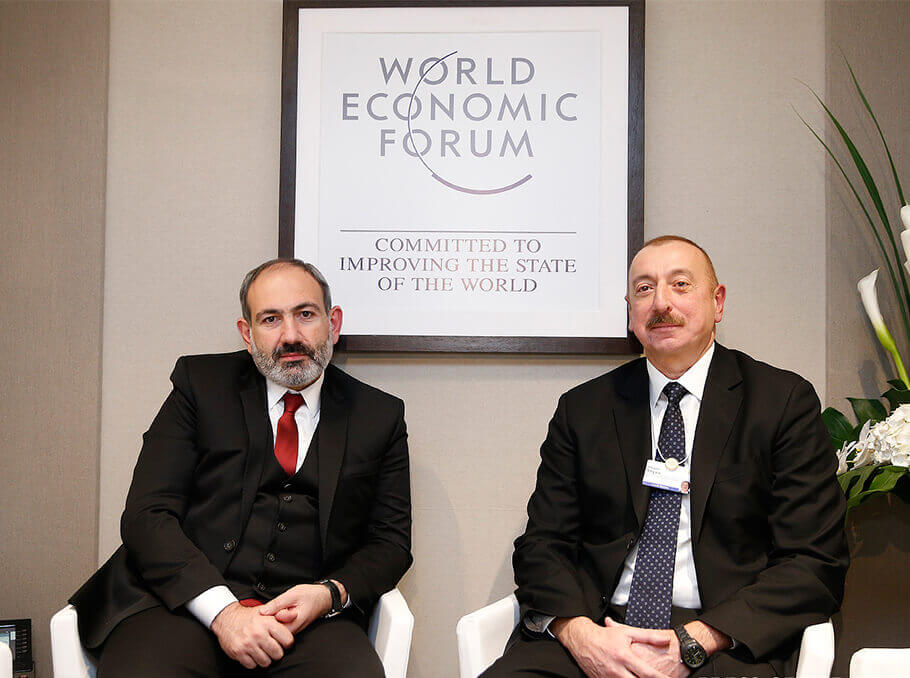Armenian Prime Minister (PM) Nikol Pashinyan met with Azerbaijani President Ilham Aliyev in Brussels on Tuesday to discuss efforts to end ongoing tensions and resolve the Nagorno-Karabakh dispute. The meeting of the two leaders was hosted by European Council President Charles Michel.
A joint statement of the meeting released by the European Council said that the talks focused on the “evolving situation in the South Caucasus region.” Michel also underscored the European Union’s (EU) “commitment to work closely with Armenia and Azerbaijan in overcoming conflict, creating cooperation and an atmosphere of trust.”
The statement noted that the EU’s goal is to achieve “sustainable peace” in the region, “underpinned by a comprehensive peace agreement.” Additionally, all three leaders vowed to establish a “secure, stable, and prosperous” South Caucasus region.
To this end, Pashinyan and Aliyev agreed to “honour” the ceasefire agreements signed in November last year and January to end hostilities over the Nagorno-Karabakh region.
Furthermore, Michel facilitated the establishment of a “direct communication link” between the defence ministers of both countries. “This mechanism can serve to prevent future incidents and make a positive impact by helping de-escalate tensions on the ground,” the statement read.
Michel also said that “resolving key humanitarian issues” should be a priority for Armenia and Azerbaijan. In this respect, he “welcomed the recent release of ten Armenian detainees by Azerbaijan and the handover of all remaining mine maps by Armenia.” He noted that the EU will continue supporting both countries in resolving humanitarian issues, including the release of Armenian prisoners of war and de-mining efforts in Azerbaijan.
In a trilateral meeting with @CharlesMichel & @azpresident we reaffirmed the agreement to relaunch the railway based on int’y accepted border & customs regulations on reciprocal principle, under the sovereignty & authority of the countries. 🇦🇲 will receive railway access to 🇮🇷🇷🇺
— Nikol Pashinyan (@NikolPashinyan) December 15, 2021
Pashinyan and Aliyev confirmed that they would be launching a new set of negotiations “on the delimitation and demarcation of the state border.” They also assured Michel that both sides would take steps “to reduce tensions on the ground to ensure a conducive atmosphere for the talks.”
Michel stressed the importance of building “connectivity links” in the region and “restoring communications infrastructure” between Baku and Yerevan. He noted that the first step would be to restore railway lines in the region and proposed the creation of an “economic advisory platform” with the help of the EU.
Finally, the trio agreed to follow up on the outcomes of the meeting.
Armenia and Azerbaijan have been engaged in constant conflict over the breakaway region of Nagorno-Karabakh since the fall of the Soviet Union. In September 2020, they fought a devastating war that led to the worst clashes in decades, killing thousands and displacing more than 100,000 people.
The fighting ended in November last year after Armenia and Azerbaijan signed a Russian-brokered ceasefire deal, which stated that Azerbaijan would remain in control of areas it recaptured from Armenia and that Russian troops would be deployed in the region to ensure that calm prevails.
However, the agreement has not held and the region has witnessed occasional bouts of violence between the two rivals. Tensions escalated in May when six Armenian soldiers were captured by Azerbaijani forces who had illegally crossed into Armenian territory. The incident led to a series of tit-for-tat attacks. After a short period of calm between September and October, fighting once again erupted last month along the border, killing eight soldiers and wounding over 20 from both sides, in what was the biggest military flare-up in the region since last year’s war.

